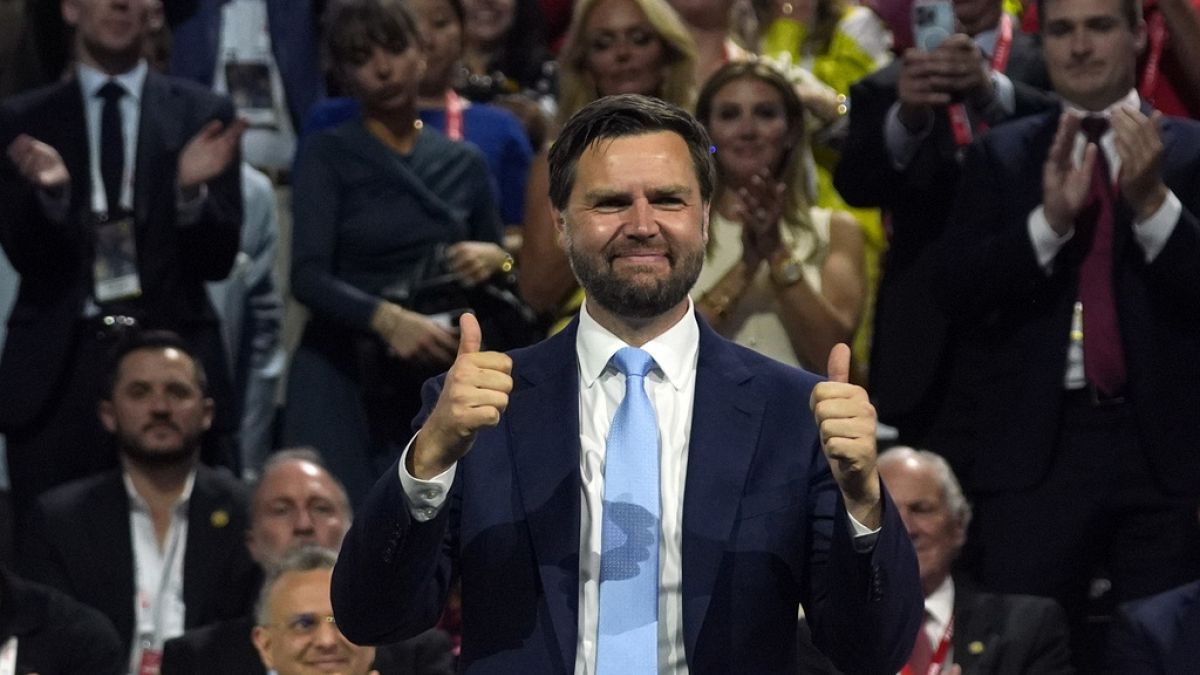JD Vance is a relative political unknown – but he’s been outspoken on Ukraine and has vehemently opposed giving more aid to the war-torn nation.
Former US President Donald Trump on Monday chose Ohio senator JD Vance as his running mate as he seeks to return to the White House.
While he’s a relative political unknown — having served as a senator since last year — the 39-year-old Republican has already raised eyebrows with conservative views veering toward the extreme.
As Vance went from one of Trump’s fiercest critics to running on the same ballot, his rhetoric anti-Ukraine aid rhetoric and a push for a nationwide abortion ban signal that, unlike former VP Mike Pence, Vance belongs to a more populist strain of US Republican politics.
Here’s everything you need to know about the man who could be America’s next vice president.
From ‘never Trump’ to fierce ally
Vance was born and raised in Middletown, Ohio. He joined the Marines and served in Iraq, and later earned degrees from Ohio State University and Yale Law School. He also worked as a venture capitalist in Silicon Valley, California.
Vance made a name for himself with his memoir, the 2016 bestseller “Hillbilly Elegy”, published as Trump was first running for president.
“Hillbilly Elegy” also introduced Vance to the Trump family. Donald Trump Jr loved the book — the two hit it off and have remained friends since.
Vance was a “never Trump” Republican in 2016. He called Trump “dangerous” and “unfit” for office.
He also criticised Trump’s apparently racist rhetoric, saying he could be “America’s Hitler.”
But by the time Vance met Trump in 2021, he had reversed his opinion. Both men downplayed Vance’s past scathing criticism.
Once elected, Vance became a fierce Trump ally on Capitol Hill, unceasingly defending Trump’s policies and behaviour.
Kevin Roberts, president of the conservative Heritage Foundation, called Vance a leading voice for the conservative movement on key issues, including a shift away from interventionist foreign policy, free market economics and “American culture writ large”.
Democrats call him an extremist, citing provocative positions Vance has taken but sometimes later amended.
Vance signalled support for a national 15-week abortion ban during his Senate run, for instance, then softened that stance once Ohio voters overwhelmingly backed a 2023 abortion rights amendment.
People familiar with the vice presidential vetting process said Vance would bring to the Republican ticket debating skills and the ability to articulate Trump’s vision.
Charlie Kirk, founder of the conservative activist group Turning Point USA, said Vance compellingly articulates the America First world view and could help Trump in states he narrowly lost in 2020, such as Michigan and Wisconsin, that share Ohio’s values, demographics and economy.
What does Vance’s selection mean for Europe?
Much of Europe has already been panicking about a second Trump presidency and its implications for US foreign policy.
The former president’s decision to pick Vance as his running mate is causing even more concern.
Vance is well known as one of the most isolationist members of the Republican Party — meaning he wants to put the US first to the detriment of other nations.
That includes Ukraine.
Earlier in 2024, he played a central role in the effort to kill off a Ukraine aid bill.
When it failed, he reiterated his position, saying, “We were able to make it pretty clear to Europe and the rest of the world that America can’t write blank checks indefinitely.”
In the past, he also blasted what he saw as Europe’s overdependence on the US over military investment.
In February, Vance spoke to Politico on why the US should give limited help to Ukraine.
“We simply do not have manufacturing capacity to support a ground war in Eastern Europe indefinitely. And I think it’s incumbent upon leaders to articulate this for their populations,” he said, “How long is this expected to go on? How much is it expected to cost? And importantly, how are we actually supposed to produce the weapons necessary to support the Ukrainians?”
Those words were spoken at the annual Munich Security Conference, where Vance also opted to skip a meeting between Ukrainian President Volodymyr Zelenskyy and Foreign Minister Dmytro Kuleba, saying: “I didn’t think I would learn anything new.”
In April, speaking on the Senate floor, he attacked both NATO and Europe for spending “too little” on defence.
“For three years, the Europeans have told us that Vladimir Putin is an existential threat to Europe. And for three years, they have failed to respond as if that were actually true,” he said, adding that Germany had failed to spend 2% of its GDP on defence – the amount NATO members have agreed to as a joint target.
His selection comes as the EU seeks to repair a damaged trade relationship between Brussels and Washington.
During his presidency, Trump imposed tariffs on European steel and aluminium imports.
Vance will likely support this as well as Trump’s promise to protect US industry if he is reelected in November.

